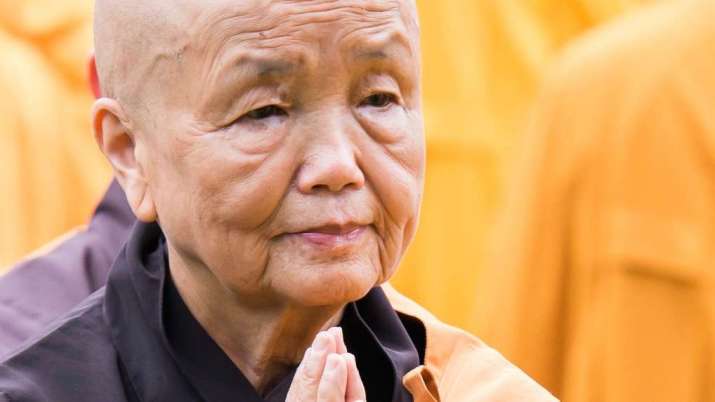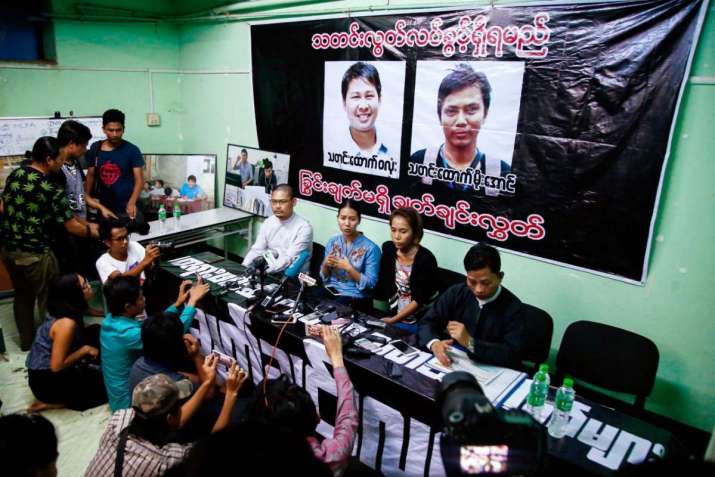NEWS
In an Open Letter, Sister Chan Khong Appeals to Aung San Suu Kyi to Reconsider Detention of Two Reuters Journalists in Myanmar
 Vietnamese Buddhist nun and peace activist Sister Chan Khong. From plumvillage.org
Vietnamese Buddhist nun and peace activist Sister Chan Khong. From plumvillage.orgSister Chan Khong, the eldest monastic member of the Plum Village community established by the influential Zen Buddhist teacher Thich Nhat Hanh and one of his closest collaborators and students, has written an open letter to Myanmar’s de facto leader Aung San Suu Kyi, appealing for compassionate action and an urgent review of the decision by the authorities to detain two Reuters journalists. The reporters, both Myanmar nationals, were covering the humanitarian crisis in the country’s northern Rakhine State, in which an estimated 655,000 Rohingya Muslims have fled an aggressive military crackdown.
Journalists Wa Lone, 31, and Kyaw Soe Oo, 27, were detained on 12 December after meeting police officers offering information, and have been charged with violating the country’s Official Secrets Act, which carries a prison sentence of up to 14 years. Myanmar’s Ministry of Information has said the two men “illegally acquired information with the intention to share it with foreign media.” (Reuters) On Wednesday, the pair were remanded in custody for a further 14 days as the investigation continues. Reuters has called for their release, insisting that the pair were only doing their jobs.
In a heartfelt message, Sister Chan Khong implored State Counselor Suu Kyi and President U Htin Kyaw to reconsider the detention of Wa Lone and Kyaw Soe Oo from the perspective of the Buddhist teachings and to act out of compassion, emphasizing the innately flawed nature of human perception:
The Buddha taught that whenever we see something, and whenever we hear something, we have the impression that we can see the object of our perceptions truly and accurately; we are sure that our perceptions are 100% correct. But, according to the teachings of the Buddha, human perceptions are, in fact, only partially correct. Perceptions may be correct in some respects, yet incomplete or incorrect in other respects. (Plum Village)
Citing Buddhist parables and her own experiences during the Vietnam War as examples of how an incomplete view of reality warps one’s perceptions, Sister Chan Khong gently urged Myanmar’s leaders to consider that the authorities may have a inaccurate perspective of the two journalists:
Dear Bodhisattva Daw Aung San Suu Kyi, dear Honorable President of Myanmar U Htin Kyaw. I beg you to reconsider your perceptions of Wa Lone and Kyaw Soe Oo. I do not seek to judge or condemn you. As a humble nun, spiritual daughter of Thich Nhat Hanh, I invite you to return to your breathing, touching the serenity that is there as you breathe in, and the clarity that is there as you breathe out. . . .
Please do not misperceive me; I am not condemning you or your decisions. Perhaps in one or two days you will be glad that you did not misjudge such beloved beautiful sons of Myanmar as Wa Lone and Kyaw Soe Oo. We know that you love all the peoples of Myanmar, but that the complex situation prevents you from acting as the Buddha in you might wish. I write this letter not to judge you but to touch the Peaceful Buddha, the Great Compassionate Bodhisattva in you, so that loving kindness can blossom in you and you can overcome the obstacles that have been blocking you. (Plum Village)
Sister Chan Khong’s latest letter follows an open letter issued earlier this year, in which she appealed for an end to the violent oppression of the Rohingya.*
 Pan Ei Mon, center left, wife of Wa Lone, and Nyo Nyo Aye, center right, sister of Kyaw Soe Oo at a news conference in Yangon on Thursday. From reuters.com
Pan Ei Mon, center left, wife of Wa Lone, and Nyo Nyo Aye, center right, sister of Kyaw Soe Oo at a news conference in Yangon on Thursday. From reuters.comThe ongoing Rakhine State crisis, which flared up after Muslim insurgents attacked police stations and an army base on 25 August, has seen more than 600,000 Rohingya flee a military crackdown and the destruction of their homes and communities in northern Myanmar for Bangladesh. According to Médecins Sans Frontières, more than 6,700 Rohingya were killed in the month following the outbreak of violence, however Myanmar’s military denies targeting civilians and says it is combating Rohingya militants. The United Nations has described the situation as a “textbook example of ethnic cleansing.”(UN News Centre) There were an estimated 1 million Rohingya in Myanmar at the beginning of this year.
Religious tensions between Buddhists and Muslims in Myanmar have simmered for almost half a century. Myanmar’s government classifies Rohingya Muslims as stateless foreign migrants, even though many communities have lived in Myanmar for generations. According to the Washington, DC-based Pew Research Center, Buddhists make up more than 80 per cent of Myanmar’s population of some 52 million, and Muslims just 4 per cent, which includes Muslims from other ethnic groups. Rakhine State—where Rohingya Muslims make up the majority in the north and Buddhists the majority in the south—has been the epicenter of the unrest.
Born in 1938, Sister Chan Khong is a Vietnamese Buddhist nun and peace activist. Since her teens, she has devoted her life to the development and practice of non-violence, grounded in the Buddhist precepts of non-killing and compassionate action, first working in the slums of Saigon, distributing food, working with the sick, and teaching children. After the war in Vietnam, she worked closely with Thich Nhat Hanh in the creation of the Plum Village Buddhist practice center in France, in the transmission of Buddhism to the West, and has helped to conduct spiritual retreats internationally. In 1993, she wrote her autobiography, Learning True Love: Practicing Buddhism in a Time of War.
* Sister Chan Khong Appeals for an End to Rohingya Oppression in Open Letter to Aung San Suu Kyi (Buddhistdoor Global)
See more
Sister Chan Khong’s Statement on Myanmar December 2017 (Plum Village)
UN human rights chief points to ‘textbook example of ethnic cleansing’ in Myanmar (UN News Centre)
Reuters journalists in Myanmar appear in court, remanded for another 14 days (Reuters)
Reuters reporters held in Myanmar were handed papers, then arrested: families (Reuters)
Myanmar frees journalists working for Turkish broadcaster (Reuters)
Related news from Buddhistdoor Global
Pope Francis Calls for Human Rights, Justice, and Respect in Myanmar, Avoids the Term “Rohingya”
Myanmar Buddhists Protest Against Repatriation of Rohingya Refugees
American Buddhist Teachers Issue Letter to Myanmar Leadership Urging Peace
Bangladeshi Buddhists Call for Peaceful Solution to Rohingya Crisis
Dalai Lama Urges Aung San Suu Kyi to Solve Rohingya Crisis in Letter
Indonesia Bans Myanmar Protests at Borobudur Buddhist Temple
Thousands Flee as Violence Flares in Myanmar’s Rakhine State
Senior Malaysian Monk Condemns Anti-Muslim Violence in Myanmar
Buddhist Aid Workers in Myanmar’s Troubled Rakhine State Risking Public Censure














